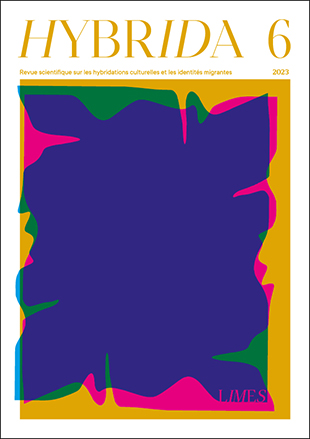Introduction : Paysages des frontières Réflexions interdisciplinaires sur les distinctions
DOI:
https://doi.org/10.7203/HYBRIDA.6.26958 Downloads
Downloads
 References
References
Amilhat Szary, Anne-Laure. (2015). Qu’est-ce qu’une frontière aujourd’hui ? PUF. https://doi.org/10.3917/puf.amilh.2015.01
Benmakhlouf, A. (2011). L’identité une Fable Philosophique. PUF Philosophies.
Chen, X. (1995). Occidentalism: A theory of counter-discourse in post-Mao China. Rowman & Littlefield.
DeLanda, M. (2006). A new philosophy of society: Assemblage theory and social complexity. Bloomsbury Publishing.
Deleuze, G., & Guattari, F. (1988). A thousand plateaus: Capitalism and schizophrenia. Bloomsbury Publishing.
Debray, R. (2010). Éloge des frontières. Gallimard.
Fanon, F. (2008). Black skin, white masks (C. L. Markmann, Trans.; New edition). Pluto Press.
Jürges, Christina. (2008). La vie en secret et le secret dans la vie : le caché dans les littératures arabe et migrante. Post-scriptum, (8). https://post-scriptum.org/08-04-la-vie-en-secret-et-le-secret-dans-la-vie/
Kuhn, T. S. (1962). The structure of scientific revolutions. University of Chicago press.
Lamont, M., Pendergrass, S., & Pachucki, M. (2015). Symbolic boundaries. International encyclopedia of social and behavioral sciences, 2, 850-855.
Moura, J.-M. (2013). Littérature francophone et théories postcoloniales. PUF.
Raffestin, C. (1986). Eléments pour une théorie de la frontière. Diogène, 34, (134), p. 3–21.
Said, E. W. (1978). Orientalism. Pantheon Books.
Szary, A.-L. Amilhat. (2015). Qu’est-ce qu’une frontière aujourd’hui ? PUF.
Wallerstein, I. (1984). The politics of the world-economy: The states, the movements and the civilizations. Cambridge University Press.
Zarycki, T. (2022). Global Context of Knowledge Production in the Peripheries. In The Polish Elite and Language Sciences: A Perspective of Global Historical Sociology (pp. 1-124). Cham: Springer International Publishing.
Published
How to Cite
-
Abstract173
-
HTML (Français )411
-
PDF (Français )198
Issue
Section
License
![]()
All the documents in the OJS platform are open access and property of their respective authors.
Authors publishing in the journal agree to the following terms:
- Authors keep the rights and guarantee HYBRIDA the right to be the first publication of the document, licensed under a Creative Commons license Attribution-NonCommercial-ShareAlike 4.0 International (CC BY-NC-SA 4.0) that allows others to share the work with an acknowledgement of authorship and publication in the journal.
- Authors are allowed and encouraged to spread their work (once published) through electronic means using personal or institutional websites (institutional open archives, personal websites or professional and academic networks profiles) once the text has been published.
















